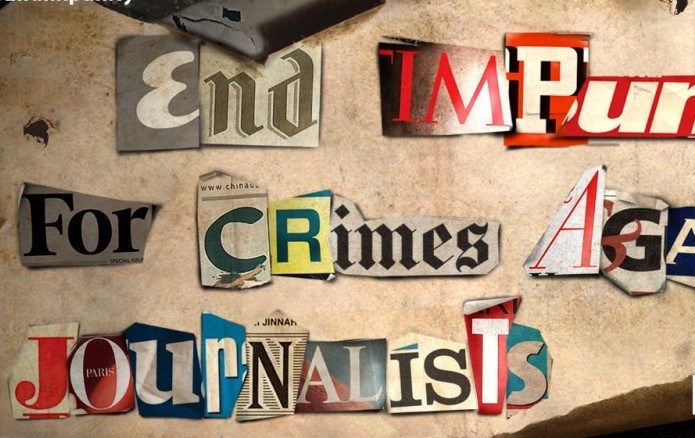The Commission has published a statement ahead of the International Day to End Impunity for Crimes against Journalists today.
The day was chosen by the United Nations General Assembly in 2013 in commemoration of the assassination of two French journalists in Mali on 2 November 2013.
The main event this year will be a roundtable discussion, organized by Ossigeno per l’informazione and supported by UNESCO, tomorrow (3 November) at the Syracuse International Institute for Criminal Justice and Human Rights in Syracuse, Italy. The event will provide a platform for dialogue among prosecutors and journalists on prevention and protection measures to address the safety of journalists.
In their joint statement, High Representative/Vice-President Josep Borrell and Vice-President Věra Jourová referred to journalists Maria Ressa and Dimitri Mouratov who received the 2021 Nobel Peace Prize as a recognition of their efforts to safeguard freedom of expression.
“Unfortunately, the stories and voices of many independent journalists continue to be silenced all over the world, including in the EU,” the Commission stated. “They face an increasing number of threats and attacks, including assassinations in the most tragic cases.”
According to the UNESCO observatory, 44 journalists have so far been killed worldwide in 2021 and many more were attacked, harassed or unlawfully imprisoned.
“Independent journalists protect freedom of expression and guarantee access to information for all citizens. They contribute to the foundations of democracy and open societies. Be it at home or around the globe, the impunity for crimes against journalists must end.”
The statement refers also to the first ever Recommendation to member states on safety of journalists which was announced in mid-September as a concrete step to improve the situation for journalists and media workers within our Union. This includes increasing protection of journalists during demonstrations, greater online safety and support to female journalists.
EU not safe any longer
While the EU is still considered one of the safest places for journalists, the trend is worrying. According to the Commission, the number of threats and attacks against them have been on the rise in the past years with the most tragic cases being assassinations of journalists. 908 journalists and media workers were attacked in 23 EU member states in 2020.
The Commission is not in the habit of naming and shaming member states so there is no breakdown of the figure by country but Reporters Without Borders (RSF) shed some light on the situation when it published the 2021 World Press Freedom Index in April this year.
The entire European continent has been fully engaged in combatting the Covid-19 pandemic but only some of its countries – including the three at the top of the Index, Norway (1st), Finland (2nd) and Sweden (down 1 at 3rd) – can claim to have defended press freedom with the energy needed to ensure the media environment is adequately supported, according to RSF.
The mechanisms by the EU to protect fundamental freedoms have yet to loosen the government’s grip on Hungary’s media or halt the draconian measures being taken in other central European countries.
In both the east and west of the continent, new legislation limiting the right to inform has facilitated arrests and detentions of journalists. Several countries have tried to limit the impact of information on sensitive subjects including the pandemic. RSF mentions as examples candidate countries (Serbia, Kosovo) where journalists have been arrested for covering the corona crisis.
Migration has proved to be a sensitive subject, for example in Greece and Spain where journalists have been prevented from contacting migrants. Since the index was published, Poland has banned journalists from entering the border region with Belarus where migrants have been stuck in limbo. Police violence against journalists has been seen in eastern EU countries (Poland and Bulgaria).
Even in Sweden, which ranks third in the Press Freedom Index, the situation is not satisfactory. An op-ed in Swedish daily Dagens Nyheter (1 November) referred to a survey among the members of the journalist association which showed that half of the members question the capacity of the judiciary to protect press freedom. A fourth of them experience harassment and threats.
According to the Commission, digital and online safety has become a major concern for journalists due to online incitement to hatred and threats of physical violence. Female journalists are particularly vulnerable to threats and a majority have experienced online violence in the course of their work.
Nearly one in three incidents occur during demonstrations, making demonstrations the most frequent place where journalists were attacked in 2020. Member states should provide regular training for law enforcement authorities to ensure that journalists and other media professionals are able to work safely and without restrictions during such events.
To reverse this trend, the Commission lays down actions for member states to improve the safety of journalists – offline and online.
Among others, the Recommendation calls for the creation of independent national support services, including helplines, legal advice, psychological support and shelters for journalists and media professionals facing threats. It also calls for an increased protection of journalists during demonstrations, greater online safety and particular support to female journalists.
It is too early to assess the impact of the Recommendation but the Commission intends to hold discussions on its implementation with member states and stakeholders in relevant forums. It will continue to analyse the safety of journalists in all the member states as part of the annual Rule of Law Report.
Member states should report to the Commission on the measures taken to implement the Recommendation 18 months after its adoption by the latest.
On 14 October, the European Parliament awarded the Daphne Caruana Prize for Journalism to the journalists from the Pegasus Project coordinated by the Forbidden Stories Consortium in memory of Daphne Caruana Galizia, a Maltese writer, blogger and anti-corruption activist, who was assassinated in a car explosion on 16 October 2017.
M. Apelblat
The Brussels Times

